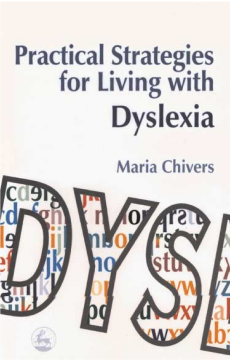
Additional Information
Book Details
Abstract
This little book does exactly what it sets out to do. It spells out all you need to know about different methods and strategies for treating dyslexia. So, if you want to know more about the many approaches to helping someone with dyslexia, then read this book. At the end of the day, you will be better informed to choose a way to suit your child. It is encouraging to read her list of famous people with dyslexia. It includes Hans Christian Anderson, Albert Einstein, Winston Churchill, Agatha Christie, Jeremy Irons, Jackie Stewart and Richard Branson. They haven't done too badly, have they?'
- www.family2000.org.uk
'This readable and useful little book has been written by a mother of two dyslexic sons. She writes about the hard road she travelled to find help and support for them. The book covers most of the questions that the parents of a dyslexic child would want answered, but it is just as useful to professionals who have a dyslexic child in their classroom or setting.
The importance of early identification is stressed and the author provides useful information about tests which can be administered to children as young as four years old.
There are informative chapters about the various successful techniques and strategies for working with dyslexic children, ranging from the well-publicised rose-coloured spectacles to the part played by a special diet.'
- Nursery World
Over the years, many quick fix approaches to cure dyslexia have been developed and used. These 'miracle cures' have offered hope to many parents who are left disillusioned by the school system and health service. With no other way to turn, many parents spend more and more money on special glasses, vitamins, exercises and specialist advice, but do they actually work? Written by a parent of two dyslexic sons, who herself searched for anything that would 'cure' them, this new book is a practical guide to dyslexia's many 'miracle cures'.
Practical Strategies for Living with Dyslexia suggests that early identification of this condition may be the key. Dyslexia is often not diagnosed until children have started school, yet testing is now available from the age of four-and-a-half. On top of this many dyslexics also have eye and ear problems that go undetected, which further exacerbates the problem.
Looking at the possible remedies available, such as tinted glasses, nutritional supplements and exercising, and considering the benefits of early identification of dyslexia, this book will be an essential practical resource for both the parents of, and the professionals who work, with people with dyslexia.
Maria Chivers is the Founder of the Swindon Dyslexia Centre. She has written and lectured on dyslexia and has also published A Parent's Guide to Dyslexia and Other Learning Difficulties. She has two sons, both of whom have dyslexia.
Table of Contents
| Section Title | Page | Action | Price |
|---|---|---|---|
| COVER | Cover | ||
| Practical Strategies\rfor Living with Dyslexia | 3 | ||
| Contents | 6 | ||
| ACKNOWLEDGEMENTS\r | 8 | ||
| FAMOUS PEOPLE WITH DYSLEXIA\r | 8 | ||
| INTRODUCTION\r | 9 | ||
| 1\rWhat are Dyslexia\rand Dyscalculia? | 11 | ||
| Dyslexia | 11 | ||
| Dyscalculia | 13 | ||
| 2\rIdentifying Dyslexia | 15 | ||
| Aston Index Assessment | 16 | ||
| Cognitive Profiling System (CoPS) | 17 | ||
| Dyslexia Screening Tests | 18 | ||
| Educational Psychologist Report | 19 | ||
| Lucid\rAssessment System for Schools | 19 | ||
| Phonological Assessment Battery | 20 | ||
| Summary | 20 | ||
| 3\rWhat Causes Dyslexia? | 21 | ||
| 4\rVision | 25 | ||
| Eye Tests | 26 | ||
| Tinted Glasses and Coloured Overlays | 26 | ||
| Dunlop Test | 30 | ||
| Visual Tracking Magnifier | 30 | ||
| Vision and Learning Difficulties by Dr Keith Holland\r | 31 | ||
| Summary | 35 | ||
| 5\rHearing | 37 | ||
| Glue Ear | 38 | ||
| Fast ForWord | 38 | ||
| Aural–Read–Respond–Oral–Write (ARROW) | 39 | ||
| Summary | 42 | ||
| 6\rDevelopment | 43 | ||
| Brain Gym | 43 | ||
| Brain Injury Rehabilitation and Development | 44 | ||
| Neuro-Developmental Delay by Gale Saye\r | 44 | ||
| 7 Chiropractic and Dyslexia by Dr Chris Vickers\r | 49 | ||
| 8\rVitamins and Minerals | 55 | ||
| Fatty Acids and Efalex | 55 | ||
| Iron Supplements | 57 | ||
| Zinc Supplements | 57 | ||
| Summary | 58 | ||
| 9\rMulti-Sensory Teaching Methods | 59 | ||
| What is Multi-sensory? | 59 | ||
| Teaching Schemes | 60 | ||
| 10\rCan Computers Help? | 63 | ||
| Software Packages | 64 | ||
| The Hands-free computer | 66 | ||
| Computers and Examinations | 66 | ||
| Psychometric Testing | 66 | ||
| 11\rNeuro-Linguistic Programming | 69 | ||
| NLP and Dyslexia | 70 | ||
| 12\rPhono-graphix | 73 | ||
| 13\rThe Value of Play | 75 | ||
| Conclusion | 85 | ||
| I'M NOT MAKING THIS MESS BY MARK CHIVERS\r | 87 | ||
| DYSLEXIA A2Z | 89 | ||
| FURTHER READING\r | 91 | ||
| USEFUL ADDRESSES\r | 93 | ||
| THE CONTRIBUTORS\r | 101 | ||
| INDEX\r | 103 |
